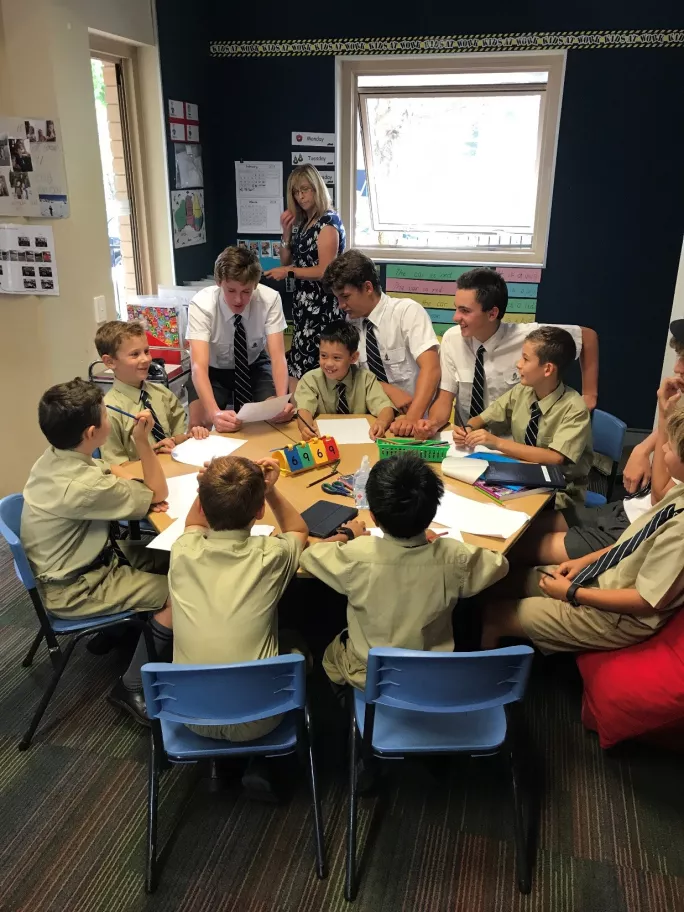- Home
- ‘For too long Australian teachers have allowed others to set the agenda’
‘For too long Australian teachers have allowed others to set the agenda’

My class of Year 9 students at SHORE secondary school in Sydney are what we call a “targeted set” because some of them have learning and behavioural difficulties.
I love teaching these kids. They make me laugh, see things with fresh eyes, expand my sense of wonder, and delight me in their eagerness to please and their openness to new learning experiences. A fair few of my students have mental health issues, ADHD and learning disabilities. Social media and gaming addictions are taking a toll on young people. Traditional schooling structures can exacerbate these issues.
Coaching basketball after school helps me to identify the young kids who love the sport, but also have discipline issues. I take the time to build a rapport with them through conversations in the playground.
This year, one of these kids landed in my Year 9 history class.
Liam wanted to do well and was trying really hard for me (probably because of the basketball connection). His first piece of writing for me was detailed, thoughtful and well structured. He had clearly put a great deal of effort into it.
I know that for students like Liam, most of the communication from school to home can be negative, so after I marked his work I rang his mum to let her know how well he was doing. When I identified myself as Liam’s teacher she immediately cried: “Oh no, what’s he done now?” She was used to receiving bad news from school. When I explained how hard he was working and how proud I was of his effort, she burst into tears on the phone. Liam ended up doing really well in history.
Every day is different. I lead the professional learning of the teachers at our school, so I am often facilitating early morning meetings from 7.30am. On these days I drive to school, about a seven minute journey. Otherwise I walk to work, which takes about 25 minutes, clears my head and allows me to plan my day.
I teach two classes (see some of my pupils below) - a full teaching load is five classes. Classes commence at 8.20am. We have six 50-minute periods. Lunch is at 12.30pm.

In my role I facilitate professional learning conversations with teachers, do lots of reading and writing, lead projects with researchers from outside the school, co-ordinate classroom observations, and oversee mentoring and coaching programmes.
I also chair the modern history examination committee for our state and regularly speak at education conferences. I have considerable autonomy in the way my work day unfolds. For half of the school year I coach basketball after school, sometimes not finishing until 6pm.
Working with adults is not the same as working with young people, although there is certainly still a sense of achievement when the entire school is being steered in the same direction. Teachers’ personal and professional identities are complicated. Some can become set in their ways and closed to possibilities. This is an ongoing challenge.
Many of Australia’s educational tensions are well-known and globally shared: top-down punitive accountability, debates about pedagogy, a climate of competition between colleagues, increasing reliance on numeric data to track learning, the negative effects of over-testing and an epidemic of anxiety. We are largely driven by performative measures. The massive surge of testing and data is eating away at the richness of the school experience. In a recent state curriculum review there were widespread calls for a reduction in content coverage and more focus on creativity, problem-solving, curiosity, flexibility, collaboration and global awareness.
If I could change one thing about my job it would be to redesign school systems around developing human capital instead of ranking students. I often ask the question: “How would teachers teach if the exam was in 20 years’ time?” Our central learning challenge is now helping people cope with a faster rate of change as digitisation and exponential acceleration fundamentally reshape the world.
Australian teachers are largely voiceless in the public discourse on schooling. It would be highly unusual for a television panel discussing education to feature a teacher involved in the debate. Teachers tend to feel uncomfortable and unprepared for such public limelight, challenged by the prospect of reducing the complexity of education to a media grab.
For too long teachers have allowed others to set the agenda. An informed and engaged population starts with us. The teaching profession requires curriculum disobedience in the same manner that university professors protect their academic freedom, and the upholding of professional ethics, just as the medical profession adhere to the Hippocratic Oath.
Cameron Paterson is a history teacher at SHORE Church of England Grammar School, in North Sydney, Australia
Keep reading for just £1 per month
You've reached your limit of free articles this month. Subscribe for £1 per month for three months and get:
- Unlimited access to all Tes magazine content
- Exclusive subscriber-only stories
- Award-winning email newsletters